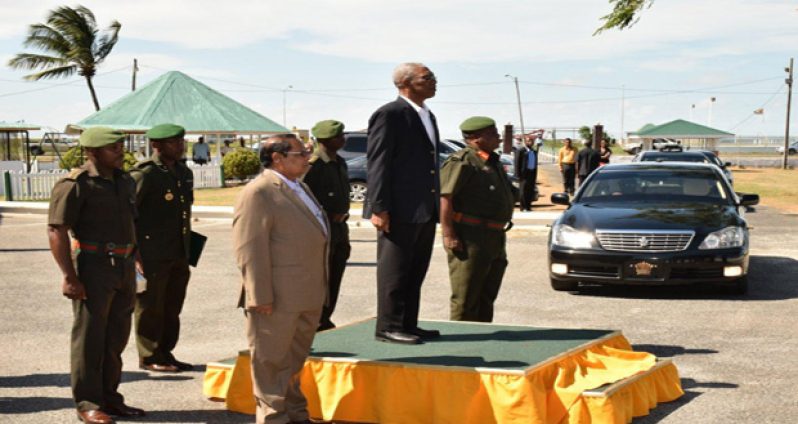Commander-in-Chief of the Armed Forces, Brigadier (Rt’d) David Granger has cautioned officers of the Guyana Defence Force that the business of catching criminals is a police task and should remain so.President Granger made the remarks when he addressed officers at Defence Headquarters, Base Camp Ayanganna on Thursday. This was in direct relation to the fact that the GDF had been deployed during the 2004-08 prison escapees-led criminal violence along the East Coast of Demerara – a decision which was condemned by many persons. The soldiers had been encamped in Buxton during that period and had also lost two of its members during confrontations with armed criminals.
The country’s president said that Guyana faced continuous challenges to public security and public order. He noted that changes in the international and national environments made some of Guyana’s old approaches to public order and national security ineffectual. He posited that “law enforcement agencies could not respond appropriately to the new threats which, if left unchecked, could allow power to fall into the hands of undesirables.”
President Granger said that criminal activities such as drug-trafficking, money-laundering, back-tracking and gun-running were often interrelated and operations could not be conducted successfully against one to the exclusion of another.
“There is a need, therefore, for the adoption of a policy of total national defence that will implement a national security strategy that employs all instruments of national power in a more integrated way to meet the challenge faced by Guyana at this time. This will require a much higher degree of inter-agency co-operation than obtains at present, to combine defence with diplomacy, economic development with law enforcement, and the civil authority with the defence force,” President Granger charged.
He stated that the Defence Act does prescribe for the Force to be charged with the maintenance of order when required and noted that “there must not, however, be an easy recourse to deploying troops in a public order role on the streets and villages. The Force should operate alongside the Police. It must always be in support of and never on its own.
“Operations, in future, should have a clear and carefully defined mission. Troops, once their mission has been accomplished, should return to barracks. The Force must not be allowed to become part of the rural landscape. The business of public order and everyday law enforcement, such as catching criminals, is a Police task and should remain so.”
He emphasized that the Police Force, not the Defence Force, had specific responsibility, under the Police Act, for:
“The prevention and detection of crime; the preservation of law and order; the preservation of the peace; the repression of internal disturbance; the protection of property; the apprehension of offenders; and the due enforcement of all laws and regulations with which it is directly charged.”
JOINT OPERATIONS
President Granger alluded to the fact that the GDF and GPF have operated jointly on several occasions in the past, noting that this was usually done only after a prolonged period of joint training, the establishment of joint operations centres which often included the co-location of troops with policemen in police compounds and, most of all, a clear definition and separation of duties and roles.
Further, touching on the delicate issue of civil-military relations, Granger said that it is the relationship between the Government of Guyana and the Guyana Defence Force, which embodies two sets of policies – the ‘institutional’, which deals with the manner in which the civilian administration formulates security policy and the ‘operational’, which deals with the military means employed to meet security threats.
According to the Commander-in-Chief, the objective of harmonious civil-military relations should be to develop a system which provides the best military security at the least social cost. He said harmonious civil-military relations must be the bedrock of democracy. “The military force, in the final analysis, must be subordinate to the civil authority,” the President told the army officers.
DEFENCE DIPLOMACY
The President also spoke about Guyana’s defence policy, as proposed in the BNSC Report, which should be in accord with the State’s foreign policy and diplomatic posture. “Defence diplomacy contributes to building of confidence between armed forces and, in extreme cases, to preventing conflict, managing crises and resolving disputes between states. Guyana has gained much by establishing itself as a reliable partner in regional and hemispheric security and stability. This form of diplomacy should be enhanced.” The GDF deployed troops for several months in 2004-2005 to assist Grenada which had been badly damaged by Hurricane Ivan. The Force had previously sent humanitarian missions to Antigua, Jamaica and Montserrat in the aftermath of destructive hurricanes in those islands. The Force also participated regularly alongside other Caribbean defence and police forces in ‘Exercise Tradewinds’, sponsored by the United States Southern Command. The Colonel Ulric Pilgrim Officer Cadet School, additionally, has provided training to officer cadets from Antigua, Barbados and Belize.



.jpg)









